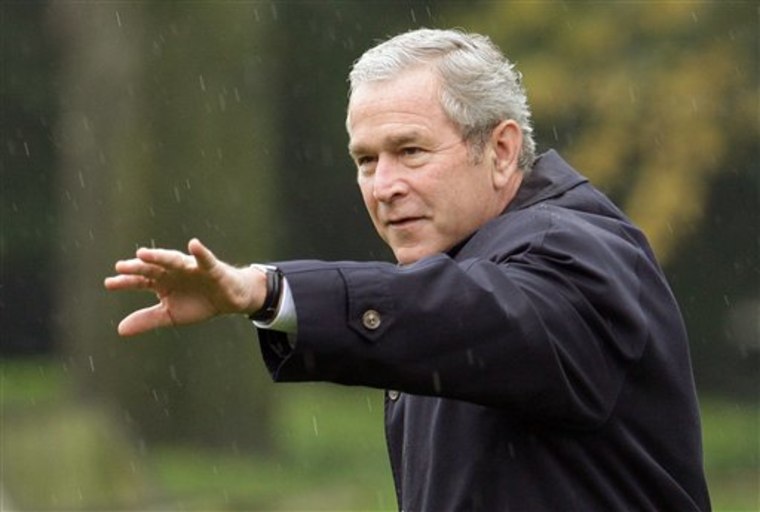President Bush, escalating his budget battle with Congress, on Tuesday vetoed a spending measure for health and education programs prized by congressional Democrats.
He also signed a big increase in the Pentagon's non-war budget although the White House complained it contained "some unnecessary spending."
The president's action was announced on Air Force One as Bush flew to New Albany, Ind., on the Ohio River across from Louisville, Ky., for a speech criticizing the Democratic-led Congress on its budget priorities.
'A teenager with a new credit card'
In excerpts of his remarks released in advance by the White House, Bush hammered Democrats for what he called a tax-and-spend philosophy:
"The Congress now sitting in Washington holds this philosophy," Bush said. "Their majority was elected on a pledge of fiscal responsibility, but so far it is acting like a teenager with a new credit card.
"This year alone, leaders in Congress are proposing to spend $22 billion more than my budget provides," the president said. "Some of them claim this is not really much of a difference and the scary part is that they seem to mean it."
More than any other spending bill, the $606 billion education and health measure defines the differences between Bush and majority Democrats. The House fell three votes short of winning a veto-proof margin as it sent the measure to Bush.
'Pure politics'
Rep. David Obey, the Democratic chairman of the House Appropriations Committee, pounced immediately on Bush's veto.
"This is a bipartisan bill supported by over 50 Republicans," Obey said. "There has been virtually no criticism of its contents. It is clear the only reason the president vetoed this bill is pure politics."
Since winning re-election, Bush has sought to cut the labor, health and education measure below the prior year level. But lawmakers have rejected the cuts. The budget that Bush presented in February sought almost $4 billion in cuts to this year's bill.
Democrats responded by adding $10 billion to Bush's request for the 2008 bill. Democrats say spending increases for domestic programs are small compared with Bush's pending war request totaling almost $200 billion.
The $471 billion defense budget gives the Pentagon a 9 percent, $40 billion budget increase. The measure only funds core department operations, omitting Bush's $196 billion request for operations in Iraq and Afghanistan, except for an almost $12 billion infusion for new troop vehicles that are resistant to roadside bombs.
Much of the increase in the defense bill is devoted to procuring new and expensive weapons systems, including $6.3 billion for the next-generation F-35 Joint Strike Fighter, $2.8 billion for the Navy's DD(X) destroyer and $3.1 billion for the new Virginia-class attack submarine.
Huge procurement costs are driving the Pentagon budget ever upward. Once war costs are added in, the total defense budget will be significantly higher than during the typical Cold War year, even after adjusting for inflation.
